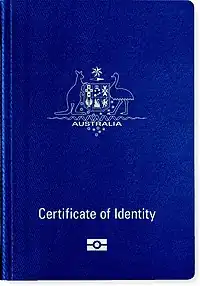| Australian Certificate of Identity | |
|---|---|
 The front cover of an Australian biometric Certificate of Identity | |
| Type | Travel document |
| Issued by | |
| Purpose | International travel document |
| Eligibility | Non-Australian citizens |
| Expiration | Maximum of 3 years |
The Australian Certificate of Identity (COI) is a biometric travel document issued by the Department of Foreign Affairs and Trade to individuals who are not Australian citizens and are about to leave Australia or one of its territories.
It should not be confused with the Document of Identity, which conversely is intended mainly for use by Australian citizens in circumstances where it would be unnecessary or undesirable to issue a passport.
Eligibility
A person in one of the following can apply for a COI:[1]
- Stateless person
- Person in Australia on a protection Class BA subclass 202 Global Special Humanitarian or Special Assistance Category 208 to 217 visas
- Holder of a Resolution of Status (RoS) visa (Class CD) subclass 851 who previously held a non-refugee visa
- Voluntary or non-voluntary returnee
- A non-Australian/non-British citizen in Australia whose government does not have a presence in Australia but who has an urgent need to travel for compassionate circumstances and who can show that their government cannot provide a travel document in time to meet their travel needs.
Use
Holders of a COI who are refugees or stateless persons and legally resident in Australia can enter Germany, Hungary and Slovenia visa-free.[2] Holders of a COI who are refugees (but not stateless persons) legally resident in Australia can enter Slovakia visa-free.[2] The maximum length of stay under these visa exemptions is 90 days in a 180-day period.
See also
References
- ↑ "Passport Manual". Archived from the original on 2012-02-28.
- 1 2 Information pursuant to Council Regulation (EC) No 539/2001 of 15 March 2001 listing the third countries whose nationals must be in possession of visas when crossing the external borders and those whose nationals are exempt from that requirement